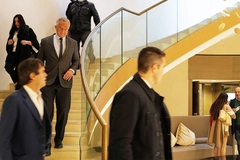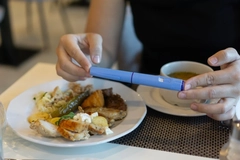
- Industry news
Industry news
- Category news
Category news
- Reports
- Key trends
- Multimedia
- Journal
- Events
- Suppliers
- Home
- Industry news
Industry news
- Category news
Category news
- Reports
- Key trends
- Multimedia
- Events
- Suppliers
Vow discusses growing cultivated meat globally as Australian regulatory approval fuels expansion

Australia’s regulatory approval of Vow’s cultivated meat last week came as the industry faces significant hurdles, including multiple US state bans and consumer skepticism about lab-grown foods. For the company’s chief operating officer Ellen Dinsmoor, the clearance sends a “powerful signal” to food regulators around the globe.
“While the industry has seen slow movement in many markets, Australia is demonstrating leadership by embracing innovation, having engaged in a collaborative, thoughtful, but open-minded process to create a strong standard for safe production and consumption of cultured meat products,” she tells Food Ingredients First.
“Having approval from Food Standards Australia New Zealand (FSANZ) provides a strong precedent that we hope other regulators will reference. Our success in demonstrating genuine commercial viability also counters skepticism about whether cultured meat can scale or gain consumer acceptance.”

Partner restaurants in Singapore report Vow’s cultured quail dishes as “top-sellers and menu favorites,” proving the cultivated meat industry can meet taste and consumer demand by prioritizing “innovation over imitation,” she adds.
After its approval and market entry in Singapore last year, the Australian regulatory nod makes it the “only company globally with proven and continuous commercial sales across multiple markets and two continents.”
 Vow didn’t just seek approval for a new product, but helped create a new regulatory framework for cultured meat, says Dinsmoor.
Vow didn’t just seek approval for a new product, but helped create a new regulatory framework for cultured meat, says Dinsmoor.
Forming a new regulatory framework
Vow took two years to obtain FSANZ’s approval, a process Dinsmoor describes as “rigorous and comprehensive.”
“Changes to the Food Standards Code itself were implemented, so we weren’t simply seeking approval for a new product, but rather created a global first of its kind: a new regulatory framework for cultured meat as a category.”
“The process involved extensive documentation of our production methods, safety protocols, and nutritional profiles. We had to demonstrate not just that our cultured Japanese quail was safe but that our entire manufacturing process met their stringent requirements.”
She believes that experience with the regulatory processes for the Singapore Food Agency and FSANZ position Vow well for future regulatory submissions in other markets.
Sparking culinary curiosity
Vow received strong interest from Australia’s culinary community even before the regulatory approval and launch, with increasing curiosity from individual consumers, says Dinsmoor.
Chef Christina Rasmussen, an alum of Denmark-based restaurant Noma and Australia-based Somma’s Mirko Febbrile, have tapped Vow’s products’ versatility and taste to create various dishes.
“We’re not asking people to accept cultured meat on principle — we’re inviting them to experience something entirely new and genuinely delicious. Once people take their first bite, they almost always come back for more,” notes Dinsmoor.
 Vow uses cell culturing to craft premium delicacies like cultured quail parfait and foie gras, offering chefs and diners new culinary experiences.“We anticipate incredible curiosity and excitement from this market — not only because Australians appreciate culinary innovation and a love for high-quality meat, but because this is genuinely Australian innovation. Locally made in Sydney’s Inner West, we’re proud to be putting Australian food innovation on the global map.”
Vow uses cell culturing to craft premium delicacies like cultured quail parfait and foie gras, offering chefs and diners new culinary experiences.“We anticipate incredible curiosity and excitement from this market — not only because Australians appreciate culinary innovation and a love for high-quality meat, but because this is genuinely Australian innovation. Locally made in Sydney’s Inner West, we’re proud to be putting Australian food innovation on the global map.”
Besides focusing on taste, Dinsmoor emphasizes the importance of “transparency” in production.
“We’re completely upfront about how we make our products. Our process reflects what naturally happens inside an animal, just with more control and care. No genetic modification, no synthetic additives, just high-quality ingredients chefs know and trust.”
Balancing scale, efficiency, and costs
Vow has built its scaling strategy around efficiency and quality from the ground up, says Dinsmoor.
“We completed the largest cultured meat harvest in history at over 1,000 kg this month, and by the end of 2025, we expect to harvest this amount multiple times per week continuously.”
She asserts that the company’s supply chain is “more predictable” than traditional meat production since it grows cells rather than raising animals, removing reliance on feed, weather, or seasonal variations.
“Having our engineering capability in-house means we can rapidly iterate and optimize our systems while maintaining cost efficiency as we scale,” she adds.
Investor backing
Despite the recent cultivated meat bans in US states, Dinsmoor sees the country as an opportunity to grow its market presence.
“The US represents an important opportunity for Vow, and we are actively monitoring regulatory and market progress and planning our approach. We are also actively participating in the UK Food Standards Agency’s (FSA) sandbox program and are working toward a submission to the FSA later in 2025.”
She also highlights a continued investor interest in the global cultured meat market.
“Vow has backing and close relationships with some of Australia’s most reputed venture capital firms, but we also have global support from firms in the Middle East and North America.”
There is also increased engagement from banks and governments, particularly in debt financing for large-scale manufacturing.
 Recent market analyses forecast the cultivated meat market to reach US$229 billion by 2050, highlighting its long term market potential.
Recent market analyses forecast the cultivated meat market to reach US$229 billion by 2050, highlighting its long term market potential.
Cultured meat and farming synergy
Dinsmoor tells us Vow’s vision is not about replacement but expansion, with room for conventional farming and cultured meat to coexist.
“Conventional agriculture will continue to feed the world, while cultured meat can address specific needs — whether that’s creating new delicacies, creating more accessibility to meats or ingredients otherwise unavailable to us today, or providing options in regions where traditional farming faces challenges.”
She calls for a focus on collaboration and innovation rather than policy actions.
“I’d love a future where cell culture can be a component of broader meat manufacturing, and we can work together to elevate and increase the production capacities of meat companies around the world, bringing even more delicious and locally produced items to consumers’ plates.”
Vow’s immediate focus is the Australian launch and partnerships with notable chefs, brands, and venues.
It is scaling its manufacturing capabilities and exploring product innovations and partnerships to create “new categories of meat driven by taste, imagination, and craft,” she concludes.









